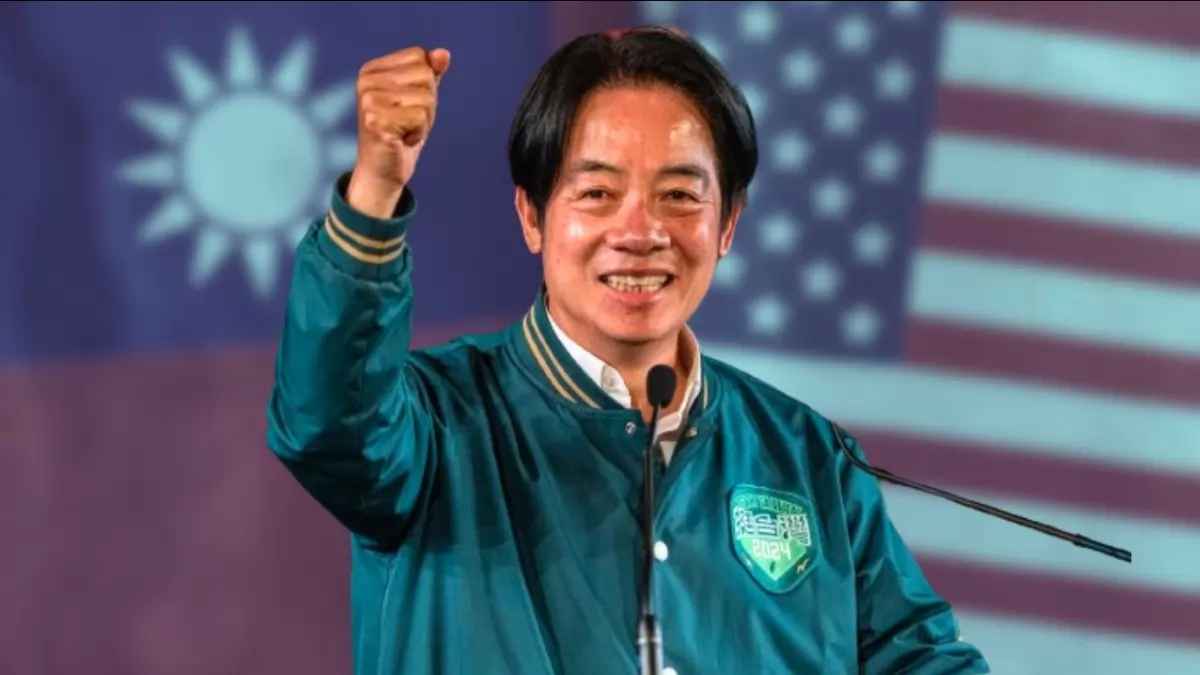
Top Indian News
The election campaign in Taiwan on Saturday, January 13, has been one of the most rigorous elections in its 26 years of democratic rule. With Lai Ching-te, leader of the ruling Democratic Progressive Party (DPP) winning the top spot, it will be interesting to see how this democratic island affects global relations, with special emphasis on the United States. Lai's party champions Taiwan's separate identity and rejects China's territorial claims.
While the US has been in support of Taiwan since its struggle for independence from China, and the two of them have maintained an unofficial relationship, the statement by the US post-Taiwan elections makes us question the United States’s stand on the Taiwan issue.
US President Joe Biden on Saturday said “We do not support independence,” ahead of polls, highlighting the country’s questionable stand on Taiwan. He also added, "It would be unacceptable" for any country to interfere in the election.
While Biden highlighted its disagreement on Taiwan's independence, U.S. Secretary of State Anthony Blinken congratulated the new President, Lai Ching-te, and the people of Taiwan for "demonstrating the strength of their robust democratic system and electoral process."
Blinken also emphasized on the US policy to maintain peace and stability in the Taiwan Strait. He also reiterated the US’s policy of wanting a peaceful relationship between Taipei and Beijing that is "free from coercion and pressure".
"We look forward to working with Dr. Lai and Taiwan's leaders of all parties to advance our shared interests and values, and to further our longstanding unofficial relationship, consistent with the U.S. one-China policy," the statement said.
"We are confident that Taiwan will continue to serve as an example for all who strive for freedom, democracy, and prosperity," the statement added.
The US-Taiwan relations have been bound by three joint communiqués it agreed with China in 1972, 1979, and 1982, the Taiwan Relations Act passed by Congress in 1979, and “six guarantees” President Reagan made to the government in Taipei (Taiwan’s capital) in the 1980s.
The US-Taiwan relationship has been maintained by what is known as “strategic ambiguity” that recognizes the People’s Republic of China’s ‘One China’ principle. The concept of "strategic ambiguity" has underpinned US policy toward Taiwan for decades, allowing Washington to balance complex ties between the self-governing island and China.
Under the longstanding approach of the ‘One China’ principle, the United States recognizes the People's Republic of China as the sole legal government of China and acknowledges Beijing's position that Taiwan is part of China. However, the U.S. stops short of formally endorsing China's territorial claim over the democratic island of 23 million people.
This in turn helps the US government to continue its relationship with China while also keeping Taiwan from being isolated on the global stage. It also helps the US government from taking hard stances on Taiwan’s sovereignty and bringing tensions to the Taiwan Strait.
Due to its ambiguous policy, the US has continued to sell arms to Taiwan over the years despite acknowledging China’s ‘One China’ principle which falls in line with the Taiwan Relations Act.
While European states adhere to a "one China" policy that precludes formal ties with Taiwan, its democracy and economic bonds still hold significance as cross-strait tensions rise. This dynamic was on full display as Taiwan's recent presidential election drew anxious attention in European capitals.
Economic Ties Fuel Interest Intensifying trade and investment links have spurred European policymakers to take a greater interest in Taiwan's political landscape and relations with China. After Singapore, Germany was the second largest foreign investor in Taiwan last year with major infrastructure projects and computer chip cooperation.
The Federal Foreign Office of Germany on Sunday, congratulated the elected officials as well as the voters who participated in the voting.
"Germany has close and good relations with Taiwan in many sectors and wants to expand them within the framework of its One-China policy," the foreign office said in a statement.
Beyond economic ties, Europe's biggest worry is a further deterioration in U.S.-China relations stemming from the Taiwanese election result. Major European powers like Germany have vital economic links with both superpowers, uncomfortably positioning them in the middle of any potential conflict.
Hours after Taiwan's election, Japanese Foreign Minister Yoko Kamikawa congratulated in a statement winner Tsai Ing-wen and reiterated Japan's view of Taiwan as a crucial partner sharing fundamental values. Despite no formal diplomatic relations since 1972, Kamikawa affirmed Tokyo's intent to continue deepening economic, cultural, and societal bonds.
"We expect that the issue surrounding Taiwan will be resolved peacefully through dialogue, thereby contributing to the peace and stability in the region," the statement said.
"For Japan, Taiwan is an extremely crucial partner and an important friend, with which it shares fundamental values and enjoys close economic relations and people-to-people exchanges," it said, repeating Japan's usual lines about Taiwan.
While based on unofficial people-to-people exchange under its "One China" policy, Japan has increasingly portrayed stability across the Taiwan Strait as a core national security priority amid escalating Chinese pressure. This shift was codified in Japan's 2022 defense strategy defining Taiwan as a vital friend.
Even as it maintains non-governmental engagement, Japan has actively sought to strengthen Taiwanese ties across various domains, launching a ruling party consultative forum and boosting investments in semiconductor manufacturing.
The Taiwan election is one of the many major elections of the year 2024. With the US presidential elections and India’s Lok Sabha elections lined up for the year, it will be worth watching how these elections and the outcome of these elections shape global politics in time.





Copyright © 2025 Top Indian News
